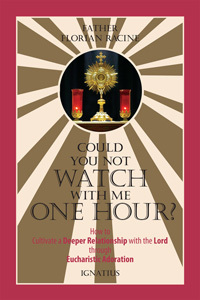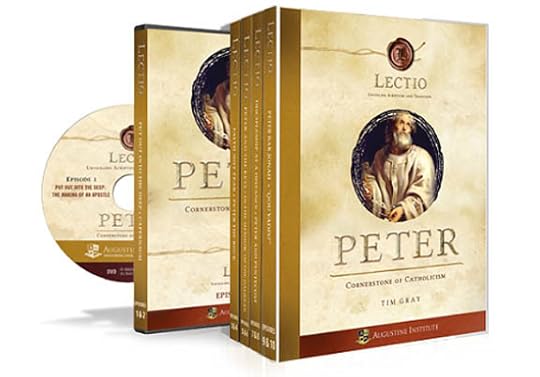Carl E. Olson's Blog, page 68
November 25, 2014
Scholars: No, Benedict XVI doesn’t support Kasper in synod debates
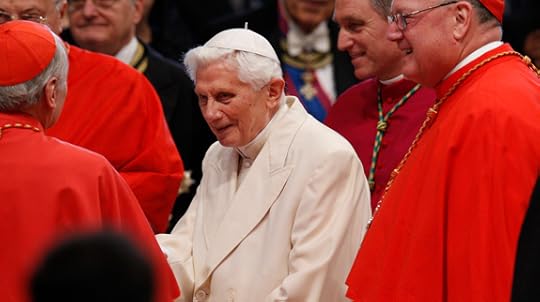
Retired Pope Benedict XVI is pictured among cardinals, including Cardinal Timothy M. Dolan of New York, right, a few minutes before the start a consistory at which Pope Francis created 19 new cardinals in St. Peter's Basilica at the Vatican Feb. 22. (CNS photo/Paul Haring)
Scholars: No, Benedict XVI doesn’t support Kasper in synod debates | CNA | Catholic World Report
A new volume of Ratzinger’s collected works includes a revised essay on the reception of Communion by the divorced and remarried.
A new volume of Benedict XVI’s collected works includes an updated version of a 1972 essay in which he had suggested that the divorced and remarried could receive Communion—but the Pope had long since abandoned that position, scholars noted.
“In his book The Gospel of the Family, Cardinal Walter Kasper cites a 1972 essay by Joseph Ratzinger…it is unfortunate that Cardinal Kasper failed to mention that Ratzinger retracted the proposal or ‘Vorschlag’ outlined in his 1972 essay,” Dr. Nicholas Healy, an assistant professor at the John Paul II Institute for Studies on Marriage and Family in Washington, D.C., told CNA Nov. 24.
As a priest of the Archdiocese of Munich and Freising, Joseph Ratzinger—who would later become Pope Benedict XVI—published an essay in 1972 which argued for access, under certain limited conditions, to Communion for the divorced and remarried. While affirming the indissolubility of marriage, Ratzinger and similar authors “appealed to certain passages in the Church Fathers that seem to allow leniency in emergency situations,” Healy wrote in a recent issue of Communio.
This line of argument was taken up in a 1977 book by Walter Kasper, who was then a priest of the Diocese of Rottenburg.
That year, Ratzinger was appointed Archbishop of Munich and Freising, and in that capacity he participated in the 1980 Synod on the Family, where he stated that “it will be up to the synod to show the correct approach to pastors” in the matter of Communion for the divorced and remarried.
The concluding document of that synod, 1981’s Familiaris consortio, found that “reconciliation in the sacrament of Penance which would open the way to the Eucharist, can only be granted to those who, repenting of having broken the sign of the Covenant and of fidelity to Christ, are sincerely ready to undertake a way of life that is no longer in contradiction to the indissolubility of marriage. This means, in practice, that when, for serious reasons, such as for example the children’s upbringing, a man and a woman cannot satisfy the obligation to separate, they ‘take on themselves the duty to live in complete continence, that is, by abstinence from the acts proper to married couples.’”
Days after that document was issued, Cardinal Ratzinger was appointed prefect of the Congregation for the Doctrine of the Faith.
Then, in 1991, a canon lawyer, Fr. Theodore Davey, suggested that confession and spiritual direction could open up the way for the divorced and remarried to receive Communion, and cited Ratzinger’s 1972 essay in support of his position.
Cardinal Ratzinger quickly retracted the “suggestions” of his 1972 essay as no longer tenable, because they were made “as a theologian in 1972. Their implementation in pastoral practice would of course necessarily depend on their corroboration by an official act of the magisterium to whose judgment I would submit…. Now the Magisterium subsequently spoke decisively on this question in the person of (St. John Paul II) in Familiaris consortio.”
The issue re-emerged in 1993...
Recognizing a Link in the Hermeneutic of Continuity
Recognizing a Link in the Hermeneutic of Continuity | Fr. Matthew J. Albright | Homiletic & Pastoral Review
Paul VI was no more the pope the “leftists” anticipated, than Jesus was the Messiah the Zealots expected.
The ranks of those declared blessed and saint by the Church under the guidance of the Holy Spirit constitute the great array of our brothers and sisters who have been lifted up as models of holiness and powerful intercessors. While blessedness and sainthood do not mean perfection in every area of life, those declared so by the Church are truly worthy of our admiration, and their commitment to Christ is to be imitated.
The beatification of Pope Paul VI on October 19, 2014, at the conclusion of the extraordinary synod on the family, indicates that the Holy Spirit has affirmed the holiness and exemplary virtue of Giovanni Montini through the occurrence of a miracle. While mortal and human, therefore prone to weakness, like the rest of us, Montini was a man utterly devoted to the Lord and the Church. While interpreted through more political lenses than most of us whose lives go relatively unnoticed, he held fast to the core of Catholicism. While attempts were made to hijack his papacy in support of everything from liturgical minimalism to Marxist Communism, he provided the essential link in Pope Benedict’s hermeneutic of continuity between the opening of the doors to fresh air by Pope Saint John XXIII and the fulfilment of the Vatican II vision in the legacy of Pope Saint John Paul II, and beyond. Having canonized these two popes, Pope Francis now paves the way for the same honor to be bestowed upon Paul VI, who, despite facing personal weakness and a maelstrom of ecclesiastical and societal conflicts, held the Barque of Peter steady through the tumultuous post-conciliar waters.
Authors in the years after the Council shed light on the life and times of Pope Paul VI, permitting today’s generation of Catholics to understand a significant era of the Catholic Church which they did not personally experience, and the factors that contributed to the Church as she is today. As early as October 1963, a mere four months after being elected as pope, his papacy was perceived as a riddle amidst various political machinations. Alice-Leone Moats reported in National Review that L’Unita, the magazine of the Italian Communist Party, “joyfully hailed the elevation to the throne of St. Peter ‘the workingman’s archbishop,’ ‘the man who typifies the progressive group of the Roman Catholic Church,’” only to lament “four days later” that “the election of Montini represents the contrary of that ‘revolutionary’ or, at least, ‘exceptional’ choice which alone could have satisfied the public.”1 Paul VI was no more the pope the “leftists” anticipated, than Jesus was the Messiah the Zealots expected. There was to be no “revolution.” Thanks be to God that neither the mission of the Church nor that of the papacy is to “satisfy the public.”
Disappointed that he was not what they hoped for, Moats continues, “the Communists” and “assorted left-wingers” “continue to hope that they were right when they thought that Montini was their man or, at any rate, that by means of flattery, threats, propaganda, misrepresentation, they can turn him into their man.”2
New: "Could You Not Watch with Me One Hour? How to Cultivate a Deeper Relationship with the Lord through Eucharistic Adoration"
Now available from Ignatius Press:
by Fr. Florian Racine
Fr. Florian Racine offers us a beautiful formation guide on Eucharistic adoration that will help us to practice it in all its depth, and with a missionary perspective.
God has made himself particularly close to mankind in Jesus his Son. The redemptive Incarnation of his Son is how God reconciles mankind with himself. The memorial of the Passover of Christ is therefore at the heart of our relationship with God. In the Blessed Sacrament, the resurrected Jesus is really present and acting; he draws all mankind into his filial relationship with the Father, through the power of the Holy Spirit.
Thus, following the plan of God, Catholics put the Eucharist at the heart of their lives, and take time to adore Jesus in the Holy Sacrament. The adorer wants to abide within the dynamic life of the Eucharist, just as he desires that the Eucharist transform his whole life. Adoration and Eucharistic life transform believers into the image of Christ.
The author invites us on an itinerary, a journey of faith, in fifty-two stages—as many as the weeks in a year. He starts by showing how the Word of God is made present in the Eucharist, and then he invites us to mature in faith and to be transformed by a greater communion with Christ.
Fr. Florian Racine, a priest in the Diocese of Frejus-Toulon, France, and the moderator of the Missionaries of the Most Holy Eucharist, a clerical association erected by Bishop Dominique Rey in 2007. He is now rector of the Basilica of St. Mary Magdalene church in Saint-Maximin, France.
Praise for Could You Not Watch with Me One Hour?:
"Eucharistic adoration is the most important devotion of our time, and Fr. Florian Racine offers us great insight and practical ideas in helping our adoration of Jesus Christ in the Eucharist bear much fruit! Give Jesus one hour and change your life! I encourage anyone who wants to grow more in love with prayer with Jesus to read this book!"
— Fr. Larry Richards, Author, Be a Man!
"These reflections are profound, but gently pastoral; sweeping, yet accessible. This is guidance and advice that is practical, realistic, and inspiring that covers topics from simple humility to bold spiritual warfare, from spiritual dryness to moments of flooding grace. Centered on scripture and punctuated with insights from saints, popes, and the wisdom of the Church across the ages, they provide a powerful exposition of him who is exposed before us in adoration."
— Daniel P. Guernsey, Editor, Adoration: Eucharistic Texts and Prayers throughout Church History
"Fr. Florian imparts to us a mine of Eucharistic truths, a volume saturated with the wisdom of the saints, which guide, prompt and compel us to re-discover the 'Prisoner of Love' who awaits us in the tabernacle—in the Sacrament of the Eucharist. Like John the Baptist, Fr. Florian directs our hearts toward the hidden and often unrecognized Messiah, who waits for each of us to discover his true presence."
— Devin Schadt, Author, Joseph's Way: Prayer of Faith
Catholic Rural Life

(© TTstudio/fotolia.com)
Catholic Rural Life | William L. Patenaude | CWR
“A large and busy family unified by working together on a family farm," says Bishop Paul D. Etienne of Cheyenne, Wyoming, "is a good worth promoting and protecting."
Blessed are you, Lord God of all creation, for through your goodness we have received the bread we offer you: fruit of the earth and work of human hands, it will become for us the bread of life.” — Prayer at the preparation of the gifts
You gain special insights when the Holy Sacrifice of the Mass is offered in the heartland of America—or any place where farming is the foundation of a culture. For Catholics whose vocation is feeding others, the gifts of bread and wine brought to the altar are not commodities from a religious supply store. They are products of soil and sweat. They exist because of business acumen, tough choices, and unyielding trust in nature, neighbors, family, and God.
The Catholic Church concerns herself with such work. She worries over the health of water and soil, the treatment of animals, the economic and nutritional value of crops, and the fair and efficient distribution of food. Most especially she embraces and supports the families and small towns that feed the world.
Farming as a sacred profession
“A large and busy family unified by working together on a family farm is a good worth promoting and protecting,” said His Excellency, Bishop Paul D. Etienne of Cheyenne, Wyoming.
The bishop made these comments earlier this month at a dinner in a St. Paul, Minnesota hotel. He spoke to other clergy as well as religious, theologians, farmers, ranchers, and their supporters.
“Society depends on the country and the farm for the produce that feeds the nation—the world,” he said. “Even more, it needs the wholesome vitality of the families produced by rural living. There is a sacramental nature to living and working in a rural setting. Farming provides a common purpose and a natural setting that helped pull and hold a family together.”
Bishop Etienne is the president of Catholic Rural Life, a small, energetic non-profit working with and for America’s farmers and rural communities. Its mission is “to apply the teachings of Jesus Christ for the social, economic, and spiritual development of rural America with responsibility for the care of God's creation.”
In 1923, Fr. Edwin V. O’Hara founded the organization in St. Louis, Missouri.
November 24, 2014
First Things hosting a lecture/book signing with Christopher Kaczor on Dec. 2
First Things invites you to attend a lecture and book signing with
Christopher Kaczor
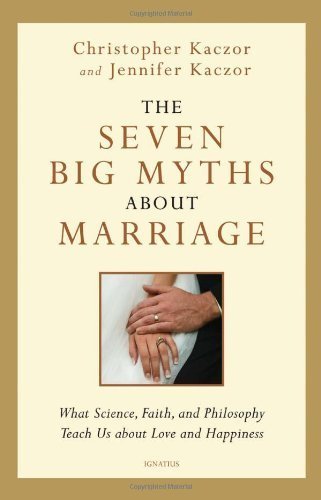
The Seven Big Myths About Marriage
When
TUESDAY
December 2, 2014
6:00–8:30 pm
Where
First Things Editorial Offices
35 East 21st St., Sixth Floor (between Broadway and Park)
212.627.1985
Dr. Christopher Kaczor is William E. Simon Visiting Fellow in Religion and Public Life in the James Madison Program at Princeton University. He is the author of several other books including A Defense of Dignity (University of Notre Dame 2013), The Seven Big Myths about the Catholic Church (Ignatius 2012), and The Ethics of Abortion (Routledge 2011).
Space is limited, so be sure to RSVP today!
Unveiling Scripture and Tradition
Introducing a brand new bible study video series featuring Dr. Tim Gray
San Francisco, November 24, 2014 – The Augustine Institute, partnering with Lighthouse Media and Ignatius Press, is excited to announce a brand new video-based study series: Lectio: Unveiling Scripture and Tradition. This dynamic series explores the truth and relevance of the Scriptures and Tradition of the Catholic Church.
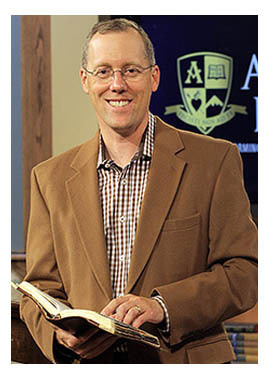
The first installment of this new series, entitled Peter: Cornerstone of Catholicism, offers an intensive and fascinating course on the life and meaning of Saint Peter. In 10 dynamic presentations given by Dr. Tim Gray — a gifted teacher and scholar from the renowned Augustine Institute – viewers learn what happens when flawed humanity comes up against God made flesh.
Bringing together biblical stories, historical knowledge, solid Church teaching, and personal insights, Dr. Tim Gray gives a fresh perspective on the life and work of the man Jesus entrusted with leadership of His Church.
Dr. Gray calls the Lectio series “a compelling new adult faith formation series that intertwines Scripture and Tradition in a rich, and uniquely Catholic way. The videos incorporate wonderful footage from the Holy Land and Rome along with a rich selection of Catholic art through the ages to visually capture the beauty and splendor of our Catholic Tradition.”
The Peter: Cornerstone of Catholicism series features 5 DVDs with over 7 hours of video presentation, a convenient Study Resource featuring 10 weeks of guided reflection, and a Comprehensive Leader Guide for effective group study.
Dr. Gray explains what makes the Lectio series unique, saying, “Lectio provides the most robust and content rich participant’s guide of any study, with daily guided meditation for personal prayer with scripture (lectio), essays on beautiful art related to the topic, geography, history, and literary insights into Scripture, memory verses along with questions and discussion points for small groups and a leaders guide.”
For more information, or to view a sample clip from Peter: Cornerstone of Catholicism, please visit: http://www.LectioIP.com
About Tim Gray: Dr. Tim Gray is the President and Co-Founder of the Augustine Institute, a dynamic new Graduate School of Sacred Scripture and Evangelization & Catechesis in Denver. A nationally renowned speaker and author, Dr. Gray has filmed numerous series for EWTN, produced multiple audio presentations for Lighthouse Catholic Media, and published numerous books and articles. He is also the co-author of the popular study series The Great Adventure Bible Timeline.
Dr. Gray is available for interviews about this series. To request a review copy or an interview with Dr. Tim Gray, please contact: Rose Trabbic, Publicist, Ignatius Press at (239) 867-4180 or rose@ignatius.com
The Time for Complacent Catholicism is Over

A worshipper holding a rosary and crucifix prays during a July 4, 2014, Mass celebrated at the Basilica of the National Shrine of the Immaculate Conception in Washington on the final day of the U.S. bishops' Fortnight for Freedom campaign. (CNS photo/Bob Roller )
The Time for Complacent Catholicism is Over | Fr. Martin R. Tripole, S.J. | CWR
A reflection on faithful fortitude and a call to Catholic courage
When is the last time you saw someone display courage?
We know it exists among public servants: soldiers, policemen, firefighters. We know it existed among the first responders at 9/11. We find it in people who sacrifice their lives for the well-being of those dearest to them, such as a father who will dive into water to save a drowning son or daughter.
But how about in Catholicism? Does it demand courage to be a Catholic today? For most of our lives, the issue never arose. Traditional Christian values were commonly accepted in America: to put it succinctly, Catholic values and civic values largely coincided. But in recent times, we have come to realize that it doesn’t take courage to be a Catholic, but only a faithful Catholic. For example, it doesn’t take courage today to be a Catholic politician who is pro-choice, but it does to be one who is pro-life.
How ready are we to stand up for traditional Catholic values and beliefs today?
The Vatican has recently stressed the courage that marks men and women of deep commitment to the faith. Pope Francis called Benedict XVI’s decision to step down as Pope on February 28, 2013, an act of “a man of great courage and humility.” At the canonization Mass of John XXIII and John Paul II, Francis referred to the new saints as “two men of courage” who “bore witness before the Church and the world to God’s goodness and mercy.” The Pope fired up 500 youth at the Vatican on August 28, 2013, when he said, “I wanted to tell you this, to tell you: courage, go forward, make noise. . . . Please, go against the current. Be courageous, courageous: go against the current.” At his June 23, 2013, Angelus reflection, Francis urged everyone, especially youth, to “have the courage to go against the tide of current values that do not conform to the path of Jesus.”
But is Francis too quickly presuming that youth today experience a clash between the tide of current values and the path of Jesus?
"The days of comfortable Catholicism are past”
It would come as a bit of a shock, I think, to many Catholics comfortable with current developments in our society, to hear the Pope speak of a clash between current values and Jesus’ teaching. It would come as an even greater shock for them to hear the remarks of Prof. Robert P. George of Princeton University, when he addressed the National Catholic Prayer Breakfast in Washington, DC, on May 13, 2014:
November 22, 2014
Jesus Christ, the divine and heavenly Logos, the only King of all creation

Stained glass window at the Melkite Catholic Annunciation Cathedral in Roslindale depicting Christ the King with the regalia of a Byzantine emperor. (January 2009 photo by John Stephen Dwyer; Wikipedia)
November 23, 2014 | The Solemnity of Our Lord Jesus Christ the King | Carl E. Olson
Readings:
• Ezek 34:11-12, 15-17
• Psa 23:1-2, 2-3, 5-
• 1 Cor 15:20-26, 28
• Matt 25:31-46
The connection between herding sheep and ruling as a king is rather unique to Scripture. In the Old Testament it is King David—dramatically raised from lowly shepherd boy to the throne of Israel (1 Sam 16:1-13; 2 Sam 5:1-4)—who personified most vividly this connection between shepherd and king, memorialized poetically in Psalm 78: “[God] chose David his servant, took him from the sheepfolds. From tending ewes God brought him, to shepherd Jacob, his people, Israel, his heritage. He shepherded them with a pure heart; with skilled hands he guided them” (vs 70-72).
Yet, significantly, it is God who is described in the Old Testament as being perfect king and righteous shepherd. He is named in the Psalms as “the great king over all the earth” who reigns over the nations and “sits on his holy throne” (Ps 47:3, 8-9). Recall, however, that when the elders of Israel demanded the prophet Samuel appoint a king over the nation it was a renunciation of God’s kingship. “They are rejecting me as their king”, said God to Samuel, “…deserting me to serve other gods” (1 Sam 8:4-9). God granted the selfish demand for a human king, but warned that mere mortal men would ultimately fail and disappoint as rulers, turning their subjects into slaves and separating them from a right relationship with God (1 Sam 8:10-18).
So even David, a man after God’s own heart (1 Sam 13:14; 16:7), failed miserably in many ways, most notably by committing adultery with Bathsheba and then arranging for the death of her husband, the loyal soldier, Uriah the Hittite (2 Sam 11). “Against you, you alone have I sinned”, wrote David after being confronted by Nathan the prophet, “I have done what is evil in your eyes; So that you are just in your word, and without reproach in your judgment” (Psa 51:6). God, the true and perfect king, will render just judgment on all men, including King David.
David’s most famous psalm is probably the one quoted in today’s responsorial: “The Lord is my shepherd; there is nothing I shall want…” (Psa 23:1). It is a short but beautiful depiction of God’s care for his people, drawing upon the image of God as shepherd that can be traced back to the first book of the Bible (Gen 49:24). The same theme is found in abundance in the reading from the prophet Ezekiel: the Lord God will tend his sheep, as well as rescue them, pasture them, give them rest, seek out those who are lost, bind up the injured, and heal the sick. There will, however, also be judgment, “I will judge between one sheep and another, between rams and goats”. Mercy and justice exist perfectly in God, who knows every heart and intention.
Just three chapters later is this passage: “David my servant shall be king over them; they shall all have one shepherd” (Ez 37:24). This servant is the Son of Man and the Son of David, Jesus Christ, described by the Apostle Paul as the new Adam who brings life to those who belong to him and destruction to those who oppose him.
The stark contrast is just as obvious in the parable of the sheep and the goats. There is no third animal; there are only two possibilities: to inherit the kingdom prepared “from the foundation of the world” or to be sent “off to eternal punishment”. In the Old Testament, of course, it is God who judges and separates the rams from the goats. The Son of Man can only judge the sheep and the goats because he shares intimately in the work of God—that is, because he is God Incarnate.
He is “the true Christ, the divine and heavenly Logos”, wrote Eusebius of Caesarea in his Ecclesiastical History, “the only high priest of the world, the only King of all creation…” At his name, at history’s end, every knee shall bow and every tongue will confess he is King and Lord.
(This "Opening the Word" column originally appeared in the November 20, 2011, edition of Our Sunday Visitor newspaper.)
November 20, 2014
New: "The Maid of Orleans: The Life and Mysticism of Joan of Arc"
Now available from Ignatius Press:
The Maid of Orleans: The Life and Mysticism of Joan of Arc
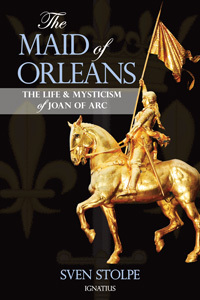
by Sven Stolpe
This acclaimed work on the life and mysticism of Joan of Arc is considered by historians as one of the most convincing, well researched and best written accounts of the Maid of Orleans. Stolpe vividly creates the contemporary situation in France during Joan's time, evaluates the latest research on her life, and arrives at an original and authentic portrait - one that is also a work of literature.
Stolpe sees Joan of Arc as primarily a mystic, and her supreme achievement and lasting significance not so much in a mission to deliver France - though important - but in her sharing in the Passion of Christ. By shifting the emphasis from the national to the universal, Stolpe brings the saint closer to the modern reader. His scholarship is informed by a profound understanding and sympathy for the Maid, giving his essentially sober work the absorbing interest of a novel.
As one critic stated, "Stolpe succeeds in producing a very tense interest, so that it is impossible to lay it aside until the last word is reached." This work should do much to present a new evaluation and appreciation of the life and mysticism of St. Joan of Arc, the Maid of Orleans.
Sven Stolpe was a highly regarded Swedish writer and historian whose other works include Dag Hammarskjold: A Spiritual Portrait, Sound of a Distant Horn, and Christina of Sweden.
Praise for The Maid of Orleans:
"There have been many books about Joan of Arc, but none surpass this study by a Swedish biographer in its recreation of Joan's milieu, the vividness of its narrative, and its sensitive understanding of the mystery of her life and death."
- James Hitchcock, Ph. D., Author, History of the Catholic Church
"The reader is transported back to France and the tumultuous world of this powerful young woman, enabling readers to embrace St. Joan's key message which was not as much about winning wars as it was winning souls for Christ."
- Teresa Tomeo, Syndicated Radio Host, Author, Extreme Makeover
"As an actress who portrayed Joan of Arc on stage, this beautiful work by Sven Stolpe made her come alive again, but in a much deeper mystical way for me. Stolpe leads us through the complex and incredible journey Heaven asked of Joan the maid. He strips away the legends about her and gets to the heart of her profound sanctity."
- Mother Dolores Hart, OSB, Author, The Ear of the Heart
T. M. Doran's new novel, "Iota", praised as "a literary triumph in a small package"
From Dr. Mark Nowakowski's review of Iota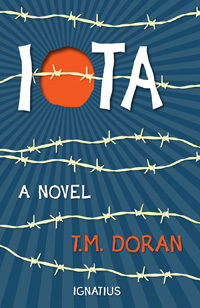 , the third novel by T. M. Doran, all published by Ignatius Press:
, the third novel by T. M. Doran, all published by Ignatius Press:
Whereas previously, major publishers seemed almost entirely focused on the negative, spiritually-neutral (or dead) sphere of relativistic writers, a new school of positivistic literature is increasingly appearing on the horizon.
Wise publishing houses like Ignatius Press seem to be snatching up the best of these emerging voices.
Enter Michigander T.M. Doran. He joins the ranks of authors Michael O’Brien and Lucy Beckett in providing searingly human yet intellectually engaging novels to a public hungry for something more fulfilling in their literary pursuits than much of current literary drivel.
Not surprisingly, efforts of authors like Doran were once left by the cynical to stew in the uncertain slush piles of the quirky independent publishing world. But happily, Doran has experienced a different fate, having found a home with Ignatius Press. Now his work is receiving the distribution it most certainly deserves as is borne out in his recent work.
A crisp and organized writer who nevertheless seems to revere the spiritual roots of language – let alone the messy glory of history – Doran’s stories unfold naturally into areas that may, in hindsight, seem at times quite fantastical. His recent effort “Toward the Gleam,” for instance, links modern Europe with the fantasy tales of a certain much reverenced mid-century English author. (Hopefully our summarization avoids a spoiler alert!)
The risk taken in such an approach steers clear of becoming derivative or turning into highbrow fan fiction. Instead, it creates a new world with utterly satisfying results.
Nowakowski concludes:
True to the fine form Doran set in his previous book, “Towards the Gleam,” “Iota” provides us with a surprising yet satisfying conclusion, during which the meaning behind the book’s title is finally revealed. Not all the remaining loose ends are tied up. But they don’t have to be, as what is essential comes quickly to the forefront.
As an added bonus, Doran furthermore illuminates a time in history that will now be unfamiliar to many of his readers, while at the same time educating them about the true nature of the dominant warring ideologies of the time.
Read the entire review on the CommDigiNews.com site.
Other praise for Iota, from the book's page.
"Iota is a plunge into the darkest waters of human motivation and character. Set in a political prison at the end of World War II, the story of the 'cage' is also a metaphor for the imprisonment of minds and souls in various forms of unbelief. It is ultimately about redemption, sacrifice, and mercy."
- Michael D. O'Brien, Author, Fr. Elijah: An Apocalypse
"A gripping read. The atmosphere of tension, squalor and fear is brilliantly sustained and the plot has thrilling twists right to the end."
- Lucy Beckett, Author, Postcard from the Volcano
"This compelling story reads like an eyewitness account. At times moving, harrowing and genuinely terrifying, Doran's Iota asks unsettling questions about the nature of innocence, guilt, courage and complicity. I simply could not put it down."
- Fiorella De Maria, Author, Do No Harm
"The urge to track down and bring to justice is a powerful one. We see it at work here in IOTA. In the end, we learn what we ought to do by not doing what we set out to do."
- James V. Schall, S. J., Author, Reasonable Pleasures
Also see, at IPNovels.com:
Carl E. Olson's Blog
- Carl E. Olson's profile
- 20 followers



